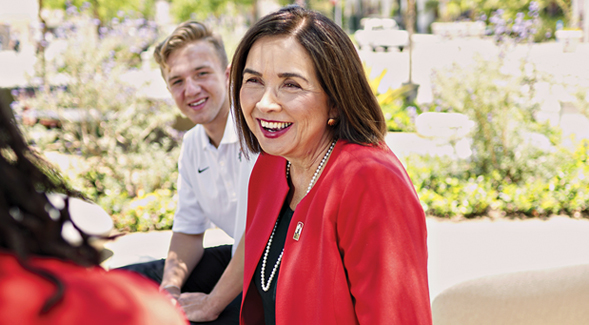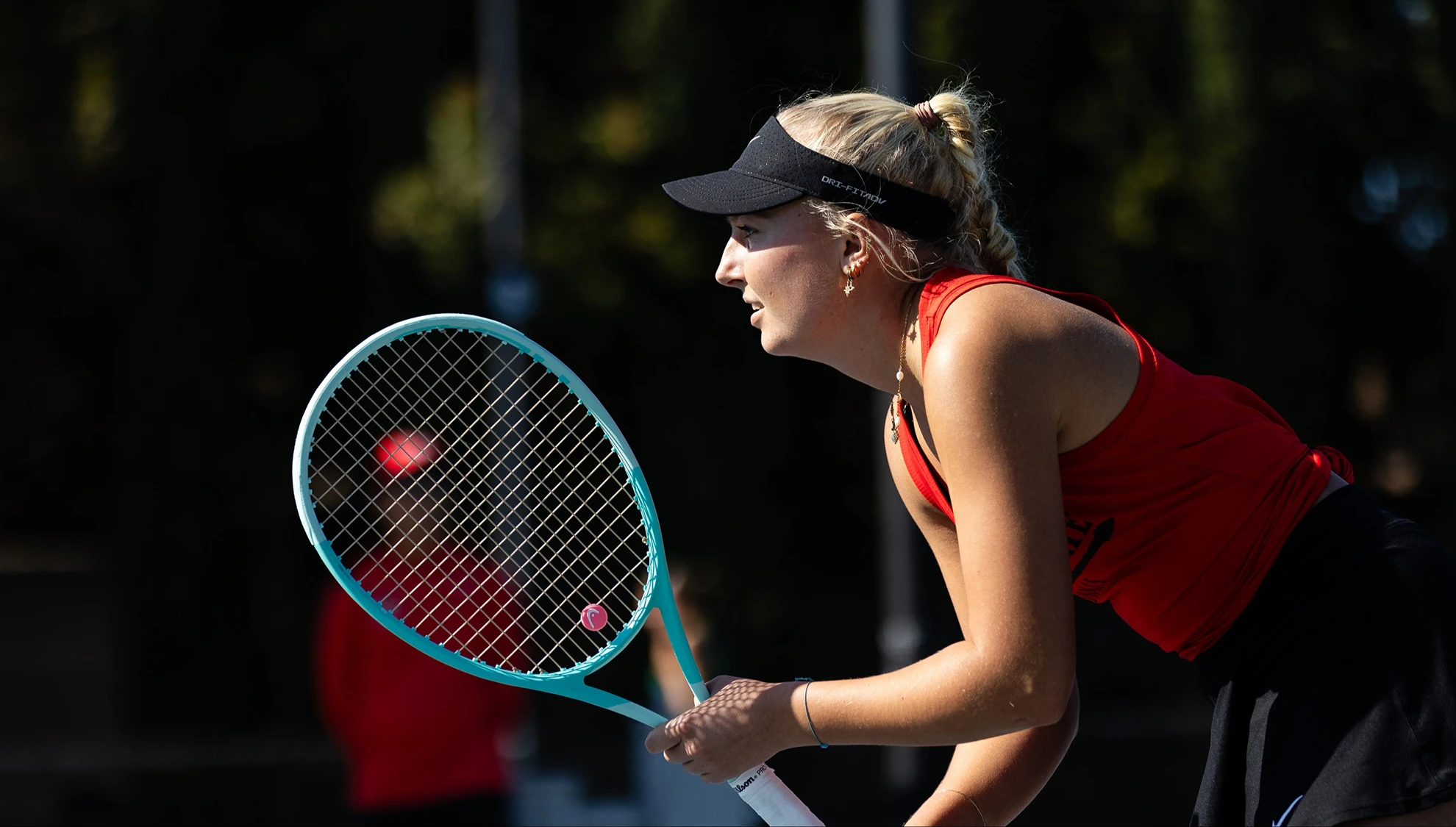Distinctly Californian
SDSUs new president is intimately familiar with the states higher education system.

This story appears in the summer 2018 issue of 360: The Magazine of San Diego State University.
For as long as Adela de la Torre can remember, her grandmother’s home in Northern California was open to friends, neighbors and relatives who wanted to visit or needed a helping hand. The family shared everything they had—meals, funny stories, strong opinions and sometimes, a bed.
It’s a lesson that stuck as de la Torre navigated through a career notable for academic collaboration, interdisciplinary research and, most recently, shared governance during six years as vice chancellor of Student Affairs and Campus Diversity at the University of California, Davis.
The word "collaborative" arises when friends and colleagues describe de la Torre. Also "compassionate," "strategic," visionary" and "energetic"—qualities highly prized by the selection committee of educators, faculty, students and community members whose recommendation led to her appointment as San Diego State University’s ninth permanent president.
“From the beginning of the selection process Adela stood out head and shoulders,” recalled Adam Day (’91), the committee chair and currently chair of the California State University Board of Trustees. “She blew us away.”
Core values
De la Torre’s personal story is distinctly Californian. Her grandparents emigrated from Zacatecas, Mexico, to California’s Central Valley, where de la Torre’s mother grew up. By the time Adela was born in 1956, the family had moved to the Oakland/Berkeley area.
De la Torre’s mother—a single parent—earned a degree from the University of California, Berkeley. While she supported the family as a public school teacher, de la Torre’s grandmother reinforced “the value of our Mexican heritage” and the power of education.
“One of the things that’s important to understand about me is that I was raised in a single-head-of-household family,” de la Torre said. “It was a journey for (my mother), as well as for me, to achieve the success we have had, and I was very fortunate to have a mother and grandmother who instilled those core values in me. They prepared me to appreciate the bicultural, bilingual environment we live in.”
De la Torre’s own nuclear family reflects the multiracial diversity of both California and her new campus. Her husband, Stephen Bartlett, a retired public health nutritionist, is Anglo. They raised two daughters, Gabriela de la Torre and Adela Hart, whose husband is African-American. And there’s grandson Javier, 3, who de la Torre describes as “the love of my life.”
Endless energy
Not only is de la Torre well versed in California’s rich cultural heritage, she is also intimately familiar with the state’s higher education system. A product of UC Berkeley, she earned a bachelor’s degree in the political economy of natural resources, and a master’s degree and Ph.D. in agricultural and resource economics. After eight years at California State University Long Beach, where she was a professor of health care administration and chair of the Chicano/Latino studies department, she joined the University of Arizona. She became director of its Mexican American Studies and Research Center and founded the College of Medicine’s first federally funded Hispanic Center of Excellence.
De la Torre returned to California in 2002 in the Chicana/Chicano studies department at UC Davis. She became department chair and director of the UC Davis Center for Transnational Health. For 14 years, de la Torre led the center’s research and intervention efforts to address education and health disparities.
She was the principal investigator for a five-year, $5 million National Science Foundation grant aimed at reducing childhood obesity through nutrition instruction, physical education and direct aid to families for the purchase of fresh fruits and vegetables. De la Torre shared her expertise with a team of 15-20 graduate students, doctoral candidates and postdoctoral reseachers plus 70-80 undergraduate student volunteers. Together, their work touched 800 children from 600 families in California’s Central Valley.
“That experience was the foundation of my skills,” said Rosa Gomez-Camacho, a postdoc at the time and now associate director for institutional research at Florida Gulf Coast University.
“Adela was highly successful as a researcher and at winning grants. I learned so much from watching her interact with different stakeholders and create networks with enormous vision and respect for people. She has endless energy, generosity and humanity.”
De la Torre generated more than $19 million in external funding to support educational outreach, recruitment, health education and training programs during her time at UC Davis. In recognition of her contributions, the university awarded her the title of distinguished professor, the first Latina in the university’s history to receive that honor.
“We felt her commitment”
As vice chancellor, de la Torre also found new ways to connect longtime and future Aggies. Enrollment of Mexican American students increased at UC Davis after the campus ramped up outreach efforts to high schoolers of Mexican heritage. Eager to support these first-generation college students both academically and culturally, de la Torre helped to resurrect the Chicanx Latinx Alumni chapter. Caroline Cabias was one of her partners in the effort.
“Adela helped articulate what an alumni association can do to support students with mentoring and scholarships,” said Cabias, the chapter leader. “She had a vision of how to move forward and a strategy to bring people together. Her support and guidance motivated our chapter to raise funds and award six scholarships—all in the space of three months.”
De la Torre’s ability to engage all UC Davis constituents was key to her popularity as vice chancellor. She earned a reputation for minimizing campus tensions, particularly during student protests triggered by incidents of violence against African Americans across the country. UC Davis staff said de la Torre is equally as adept at finding partners to defuse conflict as she is at collaborating on research projects.
“The SDSU community should know that she has no reservations about reaching out and asking for help. She doesn’t see that as a negative,” Cabias said. “Adela looks for broad input from a variety of audiences, because she understands that a person cannot get things done alone.”
Looking ahead
De la Torre is settling into the President’s Office at a time of transition for SDSU. Her predecessor, Sally Roush, resolved several important issues before she left, including an impassioned debate about the university’s Aztec identity. In deciding to retain both the Aztec name and the Aztec Warrior as spirit leader, Roush declared the Aztec identity will be portrayed with greater respect going forward. She called for the creation of a governing body to be chaired by the new president and address issues related to the ethical and fiduciary responsibility of carrying the Aztec name.
Roush also reconvened the Aztec Culture Education Committee and charged its members with implementing co-curricular programming related to Aztec history and culture. In addition, members will be tasked with recommending ways to meaningfully include local Native American tribes in SDSU’s significant functions and annual ceremonial events, such as All-University Convocation and Commencement.
On the budgetary front, SDSU’s financial stability has been reinforced by the success of its first comprehensive fundraising campaign, which raised $815 million to support students, faculty and programming. De la Torre will be expected to launch a second campaign within the next few years and involve even greater numbers of alumni in the shared effort.
The new president has emphatically supported Roush’s plan to address the university’s long-term expansion goals. SDSU Mission Valley is a detailed plan and vision for the land including and immediately surrounding SDCCU Stadium.
If allowed to purchase the land at fair market value, SDSU will build a world-class research and innovation campus and a 35,000-seat stadium for football, professional soccer and other events. The university will also create and maintain a 75-acre river park and construct affordable and market-rate housing for students, faculty, staff and the public.
Championing this sweeping agenda, de la Torre officially became the ninth permanent president of SDSU on June 28, a typically sunny San Diego summer day. Squeezed into her first-day agenda were meetings with Mayor Kevin Faulconer, San Diego Padres executive chair and co-owner Ron Fowler, university faculty and staff representatives, athletics coaches, Associated Students executives and members of The Campanile Foundation, SDSU’s volunteer fundraisers.
Her message to the community was direct and collaborative: “I am determined to be really inclusive and transparent and honest as we go forward seeking shared solutions.”
What people are saying about Adela de la Torre
“Adela has a great capacity for truly listening and engaging with people. She is able to articulate not only her understanding of this campus, but also her vision for for deepening roots with Imperial County and partnering with universities across the border.”
- Adam Day (’91)
CSU Board of Trustees chair
Chief administrative officer Sycuan Band of the Kumeyaay Nation
“Adela is an energetic leader who cares deeply about students, their academic success and their well-being. She will bring a collaborative spirit, warmth and humor to her role as president of San Diego State University.”
- Gary S. May, UC Davis chancellor
“Dr. de la Torre is a fantastic leader with enormous vision, generosity and humanity. She is respectful, and she inspires people to work together.”
- Rosa Gomez-Camacho, associate director for institutional research at Florida Gulf Coast University
“What impressed me most is how focused and strategic she is. She identifies the long-term goal and then determines how to put short-term plans in place to get there. Her passion and compassion will make her a great proponent for the (SDSU) campus.”
- Caroline Cabias, UC Davis alumna and donor



